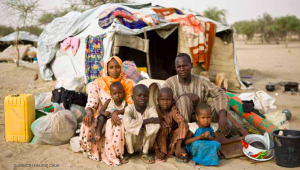by Michelle Wolf
Continuous population movement has weakened the security and protection systems in Niger. With over 302,000 refugees, internally displaced persons (IDPs), and Nigerien nationals in the Diffa region, the need to protect residents is at an all-time high. In 2016 alone, Boko Haram carried out a reported 40 attacks. And as recently as July, Boko Haram fighters attacked a village near the Nigerian border, killing nine people and abducting 40 women and children. After these attacks, an increase in arbitrary arrests highlighted the need to train defense forces and educate them on human rights. 450 of the 1,400 individuals detained under suspicion of terrorism are believed to be innocent. Assigning individuals to collect, verify, analyze and develop an updated, reliable database of targeted terrorist activities and human rights violations is essential.
Increased tensions between IDPs and refugees, and increased insecurity in the region has exasperated conflict. 82% of the Diffa population does not have the identification documents necessary to establish their nationality, which puts thousands of people at risk of statelessness. This creates challenges in tracking movements and seeking safety. To register these people, biometric technology will be needed and community participation is crucial during each step in the process.

An astounding 52% of refugees and IDPs are children. Many of these children have suffered extreme distress and have been separated from their families as they travel in search of safety. Children traveling alone are at a higher risk of neglect, exploitation, forced labor, abuse and coerced Boko Haram recruitment. Survival sex, and sex and gender-based violence (SGBV) is on the rise. It can take up to two hours a day for girls and women to collect firewood and many more hours to locate and collect safe drinking water, making them extremely vulnerable to assault and abuse.
Niger law enforcement and security services continue to actively engage in detecting, deterring, and preventing acts of terrorism but they have insufficient manpower, financial support, and equipment. Additional state and non-state “duty-bearers” need to be assigned to protect the rights of IDPs and other affected populations. Finally, increased border control facilities along Niger’s long border are needed to deter cross-border smuggling.
Much work remains, but the government of Niger and the international community are rising to the challenge. In a visit to Niger earlier this month, UN Under Secretary General for Humanitarian Affairs and Emergency Relief Coordinator, Mark Lowcock, commended the government for their efforts while recognizing the need for additional support. “I was impressed to see how brave aid workers are working with the Government to deliver assistance to the most vulnerable people in Niger under difficult and dangerous circumstances.”


